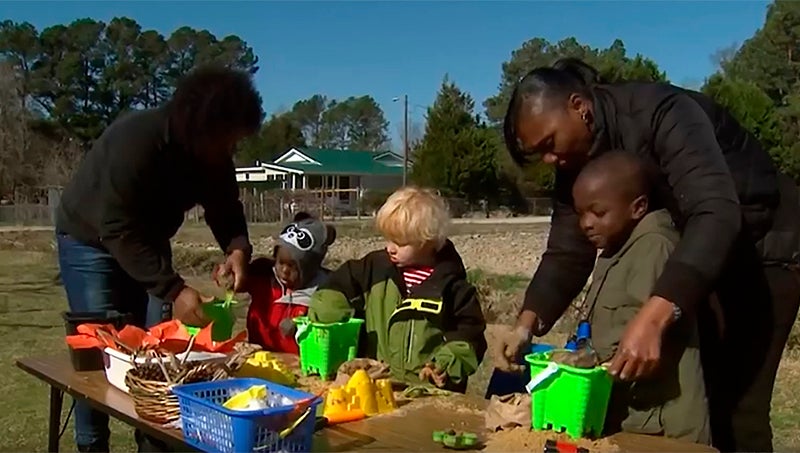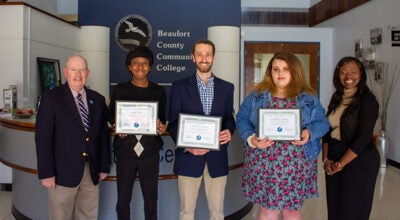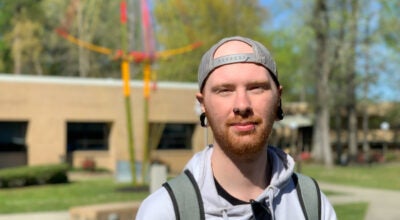Early childhood educators get an education in playing outside
Published 7:16 pm Monday, August 13, 2018

- PLAY OUTSIDE: Early educators will be able to delve deeper into introducing young children to STREAM learning, using the outdoor environment as an extension of their classrooms during a one-day training Aug. 24 at Arts of the Pamlico’s Turnage Theatre. (Beaufort/Hyde Partnership for Children)
Beaufort/Hyde Partnership for Children, Beaufort County Schools, UNCTV and the Arts of the Pamlico are partnering on cutting-edge training for early educators in Beaufort County. PLAY OUTSIDE NC–Phase III will be offered to early educators as the final capstone in the STREAM series.
The training will be held at the Arts of the Pamlico’s historic Turnage Theatre on Aug. 24, from 8:30 a.m. to 2 p.m., in downtown Washington. Paul Huggins of Beaufort County Schools and Angela Wilson of UNC-TV will lead the training day for 50 early educators working with preschool children in Beaufort County that will result in Continuing Education Units.
The PNC Financial Services Group, Inc.’s Grow Up Great Foundation is supporting BHPC’s ongoing commitment to helping young children in licensed child-care programs develop crucial school readiness skills. BHPC is excited to announce the third phase of the PLAY OUTSIDE NC Early Childhood Professional Development Training entitled PLAY OUTSIDE NC–Phase III–Play Like a Child, but Think Like an Engineer! Early educators will be able to delve deeper into introducing young children to STREAM learning, using the outdoor environment as an extension of their classrooms. This third phase will focus on using technology and engineering (the “T” and the “E” of STREAM) to hone children’s natural instincts to make sense of the world in which they live and find their natural places as critical thinkers and designers.
Trained intentional teachers using purposeful creative-play strategies easily captures young learners in wondrous ways. Freedom to explore the outdoors through creative play, hands-on activities and critical thinking is a critical component of launching children’s educational success.
The program will focus on engineering and technology through creative play for children between the ages of 3 and 5 years old, their families and their early childhood teachers. The highly successful PLAY OUTSIDE NC–Phase I and II pilot projects strengthened teacher skills in the other areas of STREAM.
“Children will often spend hours playing with wooden blocks, making a highway for toy cars, a pen for toy animals or just the highest tower,” said BHPC’s Executive Director Lisa Woolard. “We don’t always spot the developmental skills involved, but this is basic engineering.”
Early childhood educators have always recognized how building with blocks (and similar hands-on activities) help children develop motor skills while at the same time exercising their creativity. But these activities can also be framed as authentic engineering with use of technology tools through intentional lesson planning, problem-solving activities and free play.
Adding in technology and engineering experiences, even at their most basic levels, allows children to explore how they fit in with the wider world, according to Woolard.
“We look for creative play and problem solving as key components in a model early childhood classroom,” Woolard said. “Parents and teachers often need guidance in providing more meaningful STREAM experiences for young children and this third installment of PLAY OUTSIDE will complete the training for all components.
“Our goal is to help teachers see outdoor spaces as extensions of the indoor learning environment. Teachers will use nature as a vital learning tool by weaving engineering and technology into activities like building and exploring ideas,” Woolard said.
Woolard thanked PNC Grow Up Great for its support of this innovative partnership and multi-faceted project to enhance and build accessible professional development options for early educators and adults working and caring for young children.
To maintain employment in an early childhood program and their NC Early Educator Certification, early educators must earn professional development acknowledgements by earning CEUs and/or college credits. However, early educators have limited access to personal funds and time to enroll in many high quality training opportunities. In rural North Carolina, early childhood teachers may be limited further by the lack of high-speed internet services and content expertise in science and math concepts.
The PLAY OUTSIDE NC venture will utilizing media as a training tool and will offer ongoing use of the developed materials for North Carolina community college early childhood courses on the BHPC website and on UNC-TV’s website, for access by North Carolina early educators and families, according to Woolard.
The training content is aligned with North Carolina Foundations for Early Learning and Development to support continued utilization after the project. Training participants will receive training credits and a take-home kit of activities and materials to foster learning at their individual sites. Once the project is completed, more than 13,000 certified early educators and thousands of North Carolina families will have access to the educational videos and the resource library through UNC-TV’s web sites.




